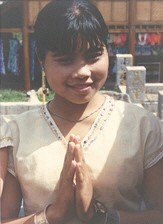Lawa, Eastern in Thailand

Photo Source:
Copyrighted © 2026
Peoples of Laos, Asia Harvest All rights reserved. Used with permission |
Send Joshua Project a map of this people group.
|
| People Name: | Lawa, Eastern |
| Country: | Thailand |
| 10/40 Window: | Yes |
| Population: | 8,500 |
| World Population: | 8,500 |
| Primary Language: | Lawa, Eastern |
| Primary Religion: | Buddhism |
| Christian Adherents: | 0.24 % |
| Evangelicals: | 0.24 % |
| Scripture: | Portions |
| Ministry Resources: | No |
| Jesus Film: | No |
| Audio Recordings: | Yes |
| People Cluster: | Mon-Khmer |
| Affinity Bloc: | Southeast Asian Peoples |
| Progress Level: |
|
Introduction / History
Despite their present small numbers, written records show that the long history of the Lawa dates back at least as far as the Tai kingdom of Kengtung (in today's north-east Myanmar) at the end of the 13th century. Documents from the time record how King Mengrai "sent troops to expel the Lawa, a tribal group that was formerly very influential in the area. Many Lawa people were exiled to live on mountains outside the city, while others became servants of the royal families at the court of Chiang Mai."
The Eastern Lawa language is not intelligible with Western Lawa. Speakers of each language in Thailand can understand some words, but generally they revert to the lingua franca of Northern Thai in order to communicate. A script was invented for the Eastern Lawa, but few have learned how to read it and today less than 1 per cent of the people are literate in their own language.
The Eastern Lawa are most concentrated in the village of Bor Luang (population approx. 3000) and 10 other villages located between Hot, OmKoi and MaeSariang. The Eastern Lawa are all located in Chiang Mai province. When you get to MaeHongSong province, they are Western Lawa.
What Are Their Lives Like?
For the most part, the Lawa people live like the Thai majority. They are noted for being expert craftsmen, especially iron workers.
What Are Their Beliefs?
Like many tribal peoples in Southeast Asia, the Eastern Lawa profess to be Buddhists, but a deeper examination reveals their dependence on animistic practices and spirit appeasement. One source says, "The Lawa worship a vast array of spirits. They are believed to be in contact with a much greater variety of spirits than many other tribal groups of northern Thailand.
Those Lawa living in remote villages still honor all good spirits, who watch over their families, the sky, the jungle, the mountains and the entrance to their village. They sacrifice pigs, chickens, rice wine and, when available, even buffaloes in order to propitiate the spirits. Since most of the Lawa have already been converted to Buddhism, only a few Lawa villages still hold such extensive and costly sacrificial rituals."
The Eastern Lawa also worship their ancestors. Most villages have their own shamans and exorcists to meditate between the people and the spirit realm. Many Lawa wear lucky charms around their necks or waists in a bid to ward off evil spirits.
What Are Their Needs?
Both foreign and tribal missionaries have visited the Eastern Lawa with the gospel, but they generally receive a lukewarm reception. The Eastern Lawa community is largely closed to outside influence, and the village leaders have tight control over the people. They don't like change, especially religious change, which many Eastern Lawa fear will bring disgrace on their ancestors and invite retribution on their communities from a host of evil spirits. Despite these pressures, a small number of Eastern Lawa families have embraced the gospel. Some have been forced to leave their village because of it.
Prayer Points
* Pray for the authority of Christ to bind hindering spiritual forces to lead them from darkness to light.
* Pray for signs and wonders among them and for great breakthroughs with a rapid multiplication of disciples and house churches.
* Pray for bold workers who are driven by the love of the Holy Spirit to go to them.
* Pray for an unstoppable movement to Christ among them.